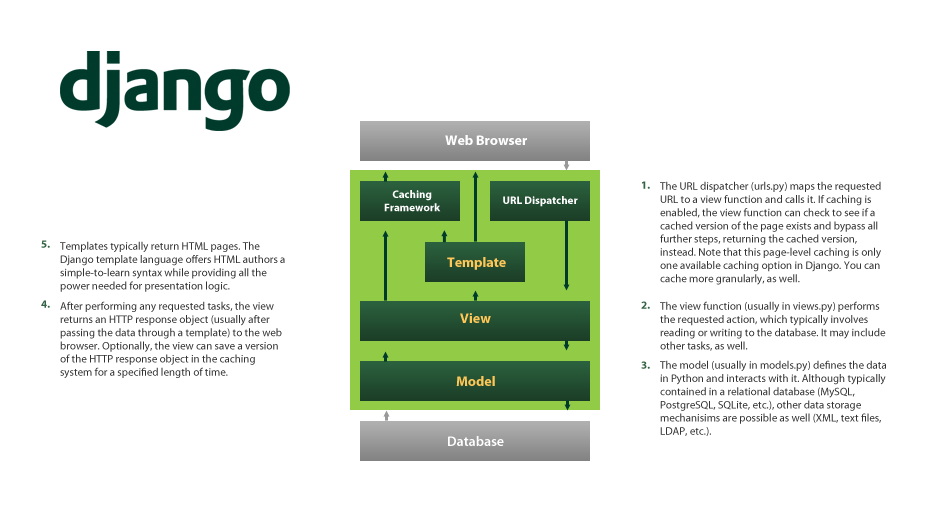Django
El rockstar de los web developers
Temática
- Desarrollo Web Apps (fácil, rápido, cómodo)
- Modelos de desarrollo
- Escalamiento
- Programación
¿A quien va dirigida?
- Programadores - Developers
- Testers
- Analistas
- Aquitectos
- ¿Diseñadores? No, a ellos no :(
Conocimientos previos.
- Conocimientos básicos de programación (En cualquier lenguaje).
- Ganas de aprender algo nuevo.
Disclaimer
- Esto no es un taller o curso de programación.
- Pregunta cuanto tengas dudas.
- ¿Admitimos a .Neteros? Si
- ¿Me gusta el café?
¿Que es Django?
Sobre Django
-
Web Framework
Django makes it easier to build better Web apps more quickly and with less code.
- Python 2.x y 3.x
- (Model Template View) Modelo Vista Plantilla
- (Object Relation Mapping) ORM Integrado
- URL's elegantes
- Internacionalización
- Interfaz Administrativa integrada
- Sistema de Cache integrado
Sobre Django

Sobre Django
¿Quienes usan Django?
- Disqus
- Mozilla
- BitBucket
- NASA
- Etc
¿ Mucha información ?
Empecemos de cero
Aprendamos Python
¿Que necesitamos?
-
Definición de:
- Tipos de Datos
- Variables
- Constantes
- Arreglos
- Listas
- Diccionarios
-
Estructuras
- Decisión: IF, ELSE, CASE
- Ciclos: FOR, WHILE, DO-WHILE
-
"Avanzado"
- Funciones
- Clases-Objetos
Ejemplos
- Hola mundo
#!/usr/bin/python print "Hola mundo" - Definiciones
nombre = "Juan" edad = 12 peso = 82.5 - Tuplas, Listas y Diccionarios
musica = ("rock", "metal", "clasica") colores = ["azul", "rojo", "verde"] usuarios_emails = { "juan": "juan@gmail.com", "jorge": "j.torres@gmail.com" }
- Funciones
def suma(a, b): return a+b - Ciclos
for i in range(100): print i while n > 0: n = n - 1 - Decisiones
if edad > 18: print "Eres mayor de edad" else: print "Lo siento, aun eres un niñato"
Aprender mas sobre python
Python para todos - Raul González DuqueEl zen de python
- Bello es mejor que feo.
- Explícito es mejor que implícito.
- Simple es mejor que complejo.
- Complejo es mejor que complicado.
- Plano es mejor que anidado.
- Disperso es mejor que denso.
- La legibilidad cuenta.
- Los casos especiales no son tan especiales como para quebrantar las reglas.
- Aunque lo práctico gana a la pureza.
- Los errores nunca deberían dejarse pasar silenciosamente.
- A menos que hayan sido silenciados explícitamente.
- Frente a la ambigüedad, rechaza la tentación de adivinar.
- Debería haber una -y preferiblemente sólo una- manera obvia de hacerlo.
- Aunque esa manera puede no ser obvia al principio a menos que usted sea holandés.
- Ahora es mejor que nunca.
- Aunque nunca es a menudo mejor que ya mismo.
- Si la implementación es difícil de explicar, es una mala idea.
- Si la implementación es fácil de explicar, puede que sea una buena idea.
- Los espacios de nombres (namespaces) son una gran idea ¡Hagamos más de esas cosas!
La arquitectura de una aplicación Django
Sistema Operativo (GNU/Linux)
Base de Datos
HTTP Server
Python
Virtualenvwrapper
Django 1.6
South
ORM
Templates
Views
Django 1.9
Djanto-Extensions
ORM
Templates
Views
Estructura de un proyecto Django
Creando un proyecto
$ django-admin.py startproject mysite
mysite/
manage.py
mysite/
__init__.py
settings.py
urls.py
wsgi.py
Deploy Modo Dev
$ ./manage.py runserver
July 03, 2016 - 01:42:54
Django version 1.9.7, using settings 'mysite2.settings'
Starting development server at http://127.0.0.1:8000/
Quit the server with CONTROL-C.
Estructura de un proyecto Django
Hermosas pantallas de depuración

Estructura de un proyecto Django
Aplicaciones
$ python manage.py startapp polls
polls/
__init__.py
admin.py
models.py
tests.py
views.py
Validación
$ python manage.py validate
0 errors found
Estructura de un proyecto Django
Migración
$ python manage.py migrate
Operations to perform:
Apply all migrations: admin, contenttypes, auth, sessions
Running migrations:
Rendering model states... DONE
Applying contenttypes.0001_initial... OK
Applying auth.0001_initial... OK
Applying admin.0001_initial... OK
Applying admin.0002_logentry_remove_auto_add... OK
Applying contenttypes.0002_remove_content_type_name... OK
Applying auth.0002_alter_permission_name_max_length... OK
Applying auth.0003_alter_user_email_max_length... OK
Applying auth.0004_alter_user_username_opts... OK
Applying auth.0005_alter_user_last_login_null... OK
Applying auth.0006_require_contenttypes_0002... OK
Applying auth.0007_alter_validators_add_error_messages... OK
Applying sessions.0001_initial... OK
Estructura de un proyecto Django
Creación Superusuario
$ python manage.py createsuperuser
Username (leave blank to use 'lesthack'): usuario
Email address: lesthack@gmail.com
Password:
Password (again):
Superuser created successfully.
Estructura de un proyecto Django
Autenticación

Estructura de un proyecto Django
Panel de Administración

El modelo Django
models.py
from django.db import models
class encuesta(models.Model):
nombre = models.CharField(max_length=200)
class pregunta(models.Model):
encuesta = models.ForeignKey(encuesta)
pregunta_text = models.CharField(max_length=200)
fecha = models.DateTimeField(auto_now_add = True)
Uso
mipregunta = pregunta.objects.get(id=1)
mipregunta.encuesta.nombre
Las vistas Django
urls.py
from django.conf.urls import url
from polls import views
urlpatterns = [
url(r'^$', views.index, name='index'),
url(r'^otro/$', views.index, name='index')
]
views.py
from django.http import HttpResponse
def index(request):
return HttpResponse("Hola mundo, estas en la vista index.")
Las vistas Django
http://localhost:8000/

Los Templates Django
views.py
def myindex(request):
nombre = 'Jorge Hernandez'
lista = range(0,100)
return render_to_response(
'index.html',
{'nombre': nombre, 'lista': lista},
context_instance=RequestContext(request)
)
templates/index.html
Este es un template
Ejemplo de valor variable: {{ nombre }}
Lista:
{% for elemento in lista %}
- {{ elemento }}
{% endfor %}
El Admin Django
admin.py
from django.contrib import admin
from polls.models import *
@admin.register(encuesta)
class encuestaAdmin(admin.ModelAdmin):
list_display = ['id', 'nombre']
list_display_links = ['nombre']
search_fields = ['id', 'nombre']
@admin.register(pregunta)
class preguntaAdmin(admin.ModelAdmin):
list_display = ['id', 'encuesta', 'pregunta_text', 'fecha']
list_display_links = ['id']
search_fields = ['id', 'encuesta', 'pregunta_text', 'fecha']
list_filter = ['fecha']
El Admin Django

Recomendaciones
Django-Suit: Interfaz Moderna (Licencia)
Grappelli: Interfaz Moderna Free
Django-Material: Interfaz Material Design Free
Django Extensions: Plugins Necesarios
Django-CMS: Content Managment
Wagtail: Content Managment
Tastypie: API
Python Social Auth: Autenticación Social
Gracias.
Twitter: @lesthack
Blog: lesthack.com.mx
Email: lesthack@gmail.com
Github: github.com/lesthack